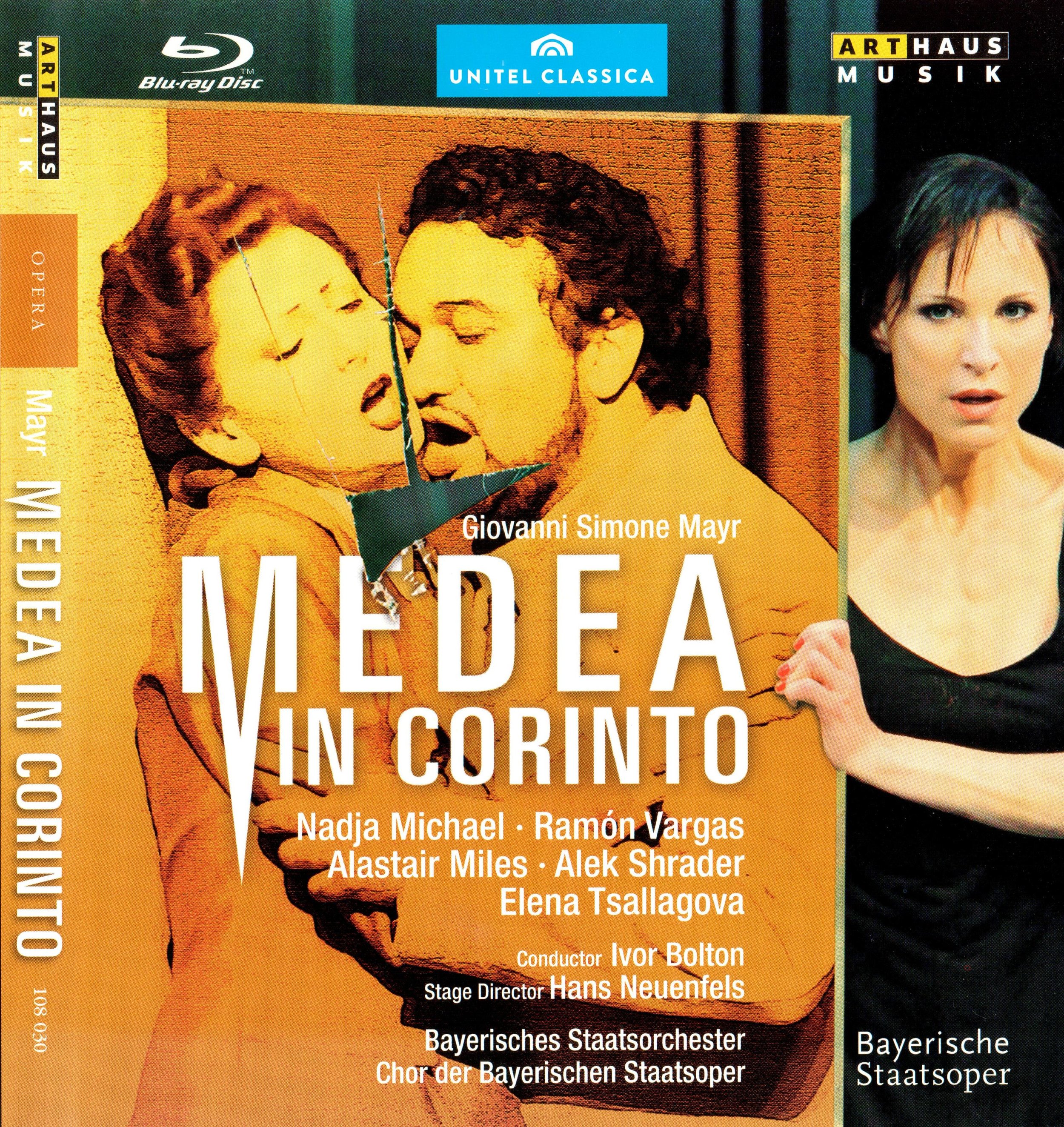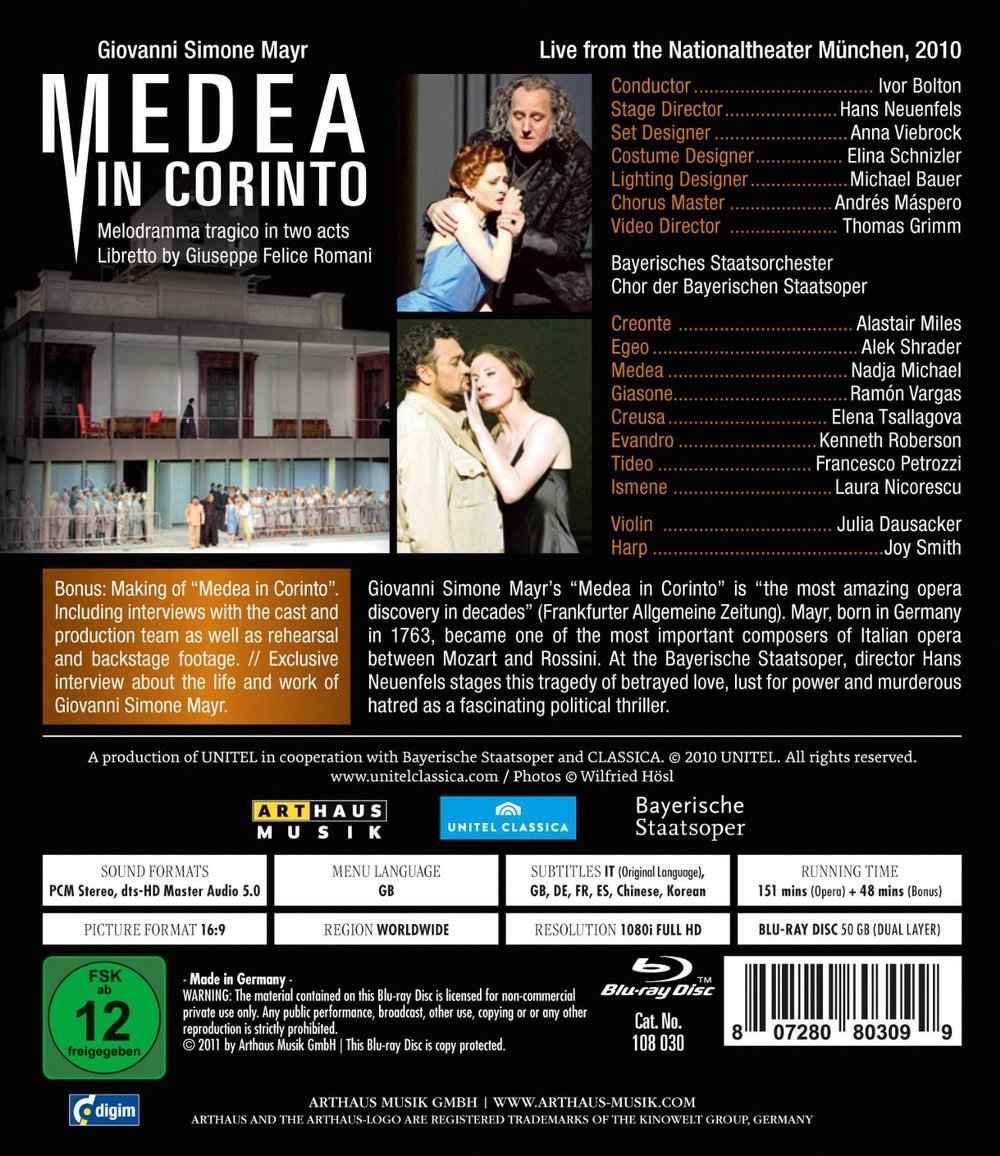

Giovanni Simone Mayr Medea in Corinto opera to libretto by Giuseppe Felice Romani. Directed 2010 by Hans Neuenfels at the Nationaltheater München. Stars Nadja Michael (Medea), Ramón Vargas (Giasone), Elena Tsallagova (Creusa), Alek Shrader (Egeo), Alastair Miles (Creonte), Kenneth Roberson (Evandro), Francesco Petrozzi (Tideo), Laura Nicorescu (Ismene), Julia Dausacker (stage violin), and Joy Smith (stage harp). Ivor Bolton conducts the Bayerisches Staatsorchester, Chor der Bayerischen Staatsoper, and the Supernumeries and Children Supernumeries of the Bayerische Staatsoper (Chorus Master Andrés Máspero). Set design by Anna Viebrock; costume design by Elina Schnizler; lighting design by Michael Bauer; assistant direction by Wolfgang Nägele, Sarah Peters, and Dominik Wagner; dramatic advisory by Rainer Karlitschek. Directed for TV by Thomas Grimm; director of photography was Werner Schwanninger. Released 2011, disc has 5.0 dts-HD Master Audio sound. Grade: C+
Mayr was once a popular composer who merged Germanic classicism and Italian opera music to become, per Rossini, the "father of bel canto." Medea in Corinto was his best of Mayr's 60 operas. It premiered in 1813, and Mayr died in 1845. His music then fell out of favor and was only recently rediscovered. Subject title appears even now (August 2018) to be the only Blu-ray ever made of Medea in Corinto. This is in many ways a thrilling disc that does full justice to a opera that should not have been neglected for 160 years. But, alas, the Han Neuenfels Regietheater stage direction ruins this for anyone not a hard-core Eurothrash masochist.
First the bel. This show belongs to Nadja Michael, who brilliantly played the role of a another killer in the HDVD Salome. Nadja is an athlete and dancer who can act and, by the way, sing opera. As tough as she is, she has the acting skill to effectively project tender love for her children just before she kills them. When she takes a bow, she locks her legs and puts her head between her knees. How many opera sopranos can do that? All the other singers are excellent. Vargas actually manages to look mature and serious. Elena Tsallagova is comely. Alex Shrader looks as if he's supposed to be playing young Beethoven somewhere. The set and lighting is adequate. The costumes are time-and-place neutral, which is OK in a production of this timeless story. All this is captured by Thomas Grimm in images of fantastic realism and beauty.
The orchestra performance is strikingly beautiful from the first to the last bar, and the sound recording is close to audiophile quality. There are two stage musicians. One is a female violin soloist who is (I think) an alter ego of Medea in what I'll call an "aria on an instrument." The other is a harpist who gets to dress up as a goddess (I think) and delivers a heaping serving of musical ambrosia.
Now the mal: the Regietheater treatment. I got down my yellow paperback of Euripides and read Medea. There's no trash in that play. Every word in the original Medea is there for a clear reason. It's a straightforward drama about a woman who is so hurt she will kill her children to get revenge on their father. The play doesn't editorializing about anything.
The core opera is about as true to Euripides as you can be while singing. But Neuenfels insists on adding a tasteless overlay of extensive irrational atrocities that pop up like sick jokes throughout the story. (He's trying to say that all societies are criminal and corrupt—got it?) I don't mind brutal updating. (As proof of that, I'll cite the "A" I gave the Salome mentioned above.) Nor do I object to overlays that show how an ancient story is grimly relevant today. (See the "A" grade I gave Rusalka where Martin Kušej turns the water spirits of ancient lore into raped girls held captive in dank basements.) But Neuenfel's directing here is trite (the iconoclast cuts up an icon), pointless, and only tends to trivialize the horror of Medea's conflict. So I think this production is a flop. The typical grade I give in this situation is C+. This means the damnation of faint praise, but with this recognition: if you like Eurotrash, you might love this recording. The audience in Munich seems to love it at curtain call time. Or was that canned applause?
David Shengold reviewed this in the March 2012 Opera News at page 64. He generally praised the singing. But he was dismayed by the staging which he found to be "violent to the point of perversity." Shengold reviewed the DVD version; he was apparently not aware there is a Blu-ray version. This is just another example of how technophobic print critics tend to be.
OR
